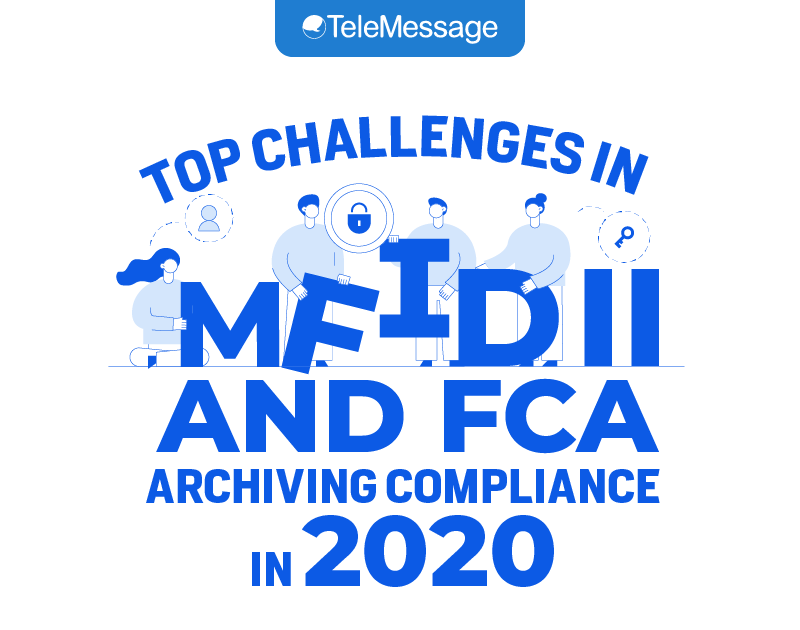Different regulations in the UK introduced strict rules regarding the recording, storage, and discovery requirements of electronic communications relating to financial dealings. While firms may have been able to comply in the past due to the employees’ use of email and desk phones to communicate, the growing popularity of text messaging, mobile phone calls, and instant messaging applications changed how firms complied with regulations.
Archiving business communications became harder to the point that several firms had to ban specific messaging apps and ensure that their employees use corporate phones or other means of communication. JPMorgan punished their traders for using WhatsApp, and similar cases occurred elsewhere as firms restricted how their employees communicated with their clients.
Despite the measures implemented by different companies against business communications done through otherwise informal means, many people continue to use their phones to contact clients and transact business.
Why you need to capture mobile communications
Employees continue to use their mobile phones and instant messaging apps to contact their clients because they prefer such channels of communication. If customers are not able to contact the firm through their preferred means, they’ll likely look for others who use their preferred communication channels. Even if the financial institution rejects modern messaging technologies to remain compliant with both MiFID II and FCA, its employees and customers will continue to demand that they adopt modern messaging tools.
By archiving mobile communications, firms can use modern tools like mobile phones to share information and contact their customers. Financial institutions need to record SMS messages and monitor phone calls to retain their customers and attract others to transact.
Capturing mobile communications also allows companies to shift to digital banking in trading, broking, wealth management, and others. Financial institutions can’t continue to ignore the continuous adoption of new mobile channels if they want to remain relevant in the industry as the demand rises in the market. Using new channels of communication lets a firm become an innovative leader in the industry and gain a competitive edge in digital banking.
Challenges with Monitoring Mobile Communications
Archiving mobile communications is not easy as different companies have different phone ownership policies. Some firms adopt corporate-issued, BYOD, COPE, and CYOD policies. In BYOD settings, many employees will use phones using different operating systems, effectively keeping institutions from utilizing only one solution to monitor electronic mobile communications. Android phones tend to allow third parties access to the user’s data, while iOS devices prioritize keeping their users’ private data secure.
There are also different regulations and network capabilities worldwide. In the US, firms can’t record phone calls without consent. Depending on the country, the network carrier may or may not be able to capture mobile messages and calls.
The growing popularity of WhatsApp among the employees and customers makes it difficult to monitor communications thanks to its end-to-end encryption. No one can snoop in on the participants’ conversations, making it challenging to surveil what’s happening.
Taking all of this into account, monitoring mobile communications becomes increasingly difficult since there is no universal solution that can monitor messages and calls made through Android and iOS phones and legacy and feature phones. For companies using WhatsApp, FCA and MiFID II compliance become complicated when the company with BYOD policies has employees using Android and iOS devices.
How to Archive Mobile Communications
There is no universal solution that can record every single electronic message coming in and out of every single phone. However, there are multiple solutions available to do so with their respective pros and cons.
Network Integration
Some mobile operators created an application in the network that allows them to record messages and capture voice calls. Firms don’t need to install an app to capture their employees’ communications, and the employees don’t need to interact with the application as long as they subscribe to the service. This option is suitable for corporate-issued phones, even legacy, and feature phones since all of the messages and calls are captured. Firms can’t use this option to record WhatsApp chats and calls.
Android Agent
Like network integration, the android agent captures every message on the phone and does not require the employee to interact with it. The archiving agent only works on android phones since it’s impossible to capture iOS messages using an agent. This archiving option should only be used on corporate phones since it captures all SMS & MMS messages and voice calls made using the native messaging and phone call applications.
Enterprise Number
Companies can opt to use a virtual enterprise number to archive their employees’ communications when they communicate using the number. The phone has two phone numbers, the personal one and the enterprise one. The employees need only to use the enterprise number to record their business communications without worrying about capturing their personal messages. An enterprise number works on Android and iOS devices, making it advisable for companies with BYOD policies.
WhatsApp Wrapper or Web Capture
Because the above options didn’t include capturing messages and calls made in WhatsApp, firms need another solution to archive WhatsApp communications. Financial institutions can comply with WhatsApp MiFID II and FCA when using a WhatsApp wrapper or web capture. The firms need to consider whether or not their employees have to install another application or not. The wrapper requires users to install another app while web capture does not.
Complying with MiFID II and FCA Archiving Requirements and Gaining New Value
After investing in the archiving solution that a financial institution requires to comply with regulations, they can then use such solutions to improve their processes. The communications data are no longer retained in different silos, and they can be easily retrieved through eDiscovery.
Firms can have an easier time monitoring their employees’ communications and ensure that their employees communicate properly without using abusive speeches. The quality and content of voice calls can be checked on and used for surveillance purposes. Smoother internal investigations can be accomplished when their archiving solution has excellent eDiscovery capabilities.
The TeleMessage Mobile Archiver effectively addresses compliance, regulatory, and eDiscovery response requirements and reduces risk across various industries. TeleMessage captures mobile content, including SMS, MMS, Calls, WhatsApp calls, and chats from corporate or BYOD mobile phones. The messages are securely and reliably retained within TeleMessage servers or forwarded to your choice archiving data storage vendor.
Our mobile archiving products securely capture content from mobile carriers and mobile devices for various ownership models (BYOD, CYOD, and employer-issued). With our multiple archiving solutions, you can always find the right tools or blend for your requirements:
TeleMessage offers cross-carrier and international mobile text & calls archiving for corporate and BYOD phones. Contact us to learn more about how our mobile archiving products can help your company or agency record mobile messages for a effective MiFID II and FCA compliance.



